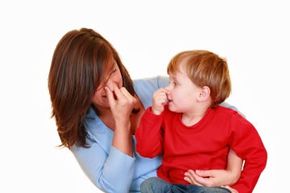It's easy to blame body odor -- also called bromhidrosis -- on your sweat. After all, your body has about 2.6 million sweat glands that can crank out about a pint of sweat every day ... and that's not including workouts. Yet, you never meet a baby with body odor. When is it that we start to smell? To figure that out, first you have to understand what causes body odor.
It's not actually the sweat or sweat glands that cause body odor: The bacteria that live on our skin take the blame for the smell. Those bacteria feed on a type of sweat that your body starts to produce only after you reach puberty.
Advertisement
The human body has two types of sweat glands. The eccrine glands excrete sweat that's made mostly of water and salt. This sweat is part of the body's air conditioning system -- as it evaporates, it keeps the body cool. Babies need to stay cool, too, so the eccrine glands start doing their work long before you reach puberty.
It's sweat from your other sweat glands, the apocrine glands, that can cause a smell. Apocrine glands are located in the hair follicles. The sweat released from the apocrine glands contains fatty acids and proteins and is thicker than sweat from the eccrine glands. Sweat from apocrine glands isn't released to help us cool down, but rather it's secreted when we're under stress (emotional stress, physical stress and also physical and sexual excitement).
Bacteria are attracted to the fatty acids and proteins in sweat from the apocrine glands. As they process these substances, the bacteria emit byproducts that cause body odor.
While you're born with them, your apocrine glands don't turn on until you reach puberty. The age of onset for puberty differs between boys and girls, and according to race. For girls, puberty normally begins between ages nine and 13, while for boys it happens between ages 10 and 14.
Advertisement
